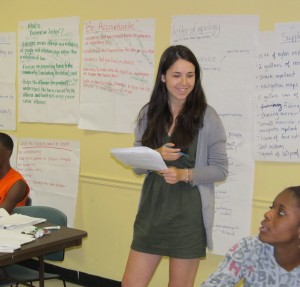“In Their Own Words” is an ongoing series featuring the experiences of Middlebury students at their summer internships. This summer Alice Oshima ‘15 interned with the Harlem Community Justice Center in New York City.
This summer, I interned with the Harlem Community Justice Center, which is part of the umbrella organization the Center for Court Innovation. Inside the Harlem Community Justice Center, there is a housing court, a family court, a re-entry court, and a youth court. The housing, family, and re-entry courts operate as legitimate New York State courts, but with a specific focus on restorative justice. The youth court on the other hand, which is the program I was working with, works outside the court system and relies of referrals from precincts, the law department, and schools. For my internship, I worked with my supervisor and two other interns to facilitators the trainings of the youth court members. I lead ice-breakers or warm-ups before most sessions—one of the most popular of which was the Enneagram personality test. I facilitated the introductory training, as well as trainings on appropriate sanctions, perceptions and assumptions, and jury deliberation. These lessons were based on the youth court training curriculum created by the Center for Court Innovation, but I was encouraged to make any changes or additions I saw fit. In addition to these curriculum-based trainings, I helped facilitate a session on feminism and gender roles created by a fellow intern. I also began developing curriculum for workshops on mental health and teenagers, and race and the criminal justice system, but was unable to finish and facilitate them due to time. I researched and compiled a list of suggest videos for the training sessions or for the coming year—this list included TED talks, spoken word poems, and documentary clips.
What did you learn?
Before this internship, I had very little knowledge regarding the logistics of our criminal justice system, as well as the flaws with this system. From leading training sessions, and watching my supervisor and fellow interns lead sessions, I learned a great deal about how the court system works and the possibilities offered by restorative justice, but also about some of the shortcomings of the current restorative justice projects available. The internship also gave me experience modifying curriculum, teaching lessons, and in general, working with young people. These experience was very educational, as well as fun! But it was also my first time doing any of these things, and so with time, I think I would have gotten better at making the lesson plans even more dynamic and fully engaging all of the youth. Although I feel I made progress, as a teacher, there is still a lot a lot of work for me to be done.
What are your plans for the future?
In terms of my future plans, I do not plan to specifically focus on restorative justice as a career, but I plan to be involved in social activism for my lifetime and engage with the mass incarceration of predominantly black and Latino men in this country, and the major flaws in our criminal justice system in general, are issues that I hope to continue to be work with in the future. I also am highly considering either being a New York City public high school teacher, or working with high-school aged youth in some other capacity, and so the experience I gained working with that age group will definitely be valuable.
Think this experience sounded pretty cool? Check out opportunities like this and more on MOJO.
